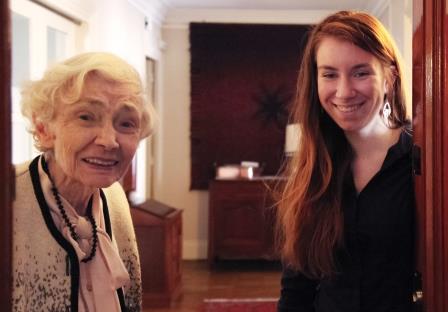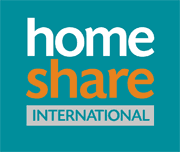Homeshare programmes are diverse, operating with different business models and varying approaches to what the users are offered. What unites them all is that homesharing is an exchange of services – ‘ a room in exchange for some help at home’ – where the relationship between the two parties is generally brokered by a professional.
In 2015 we surveyed 48 programmes in 11 countries to find out more about the business models programmes were using.
This showed that the majority of homeshare programmes are run by charities or other not-for-profit agencies, while only a few are businesses. The majority of programmes provide their service free to the applicants but a substantial minority charge a fee to cover administrative costs. This may be an introductory fee or may be a monthly payment.
Read the findings of this survey in our Factsheet 1 Business models for homeshare programmes.

Homesharers matched by e2g. Photo courtesy of Maëlenn www.maelenn.com
What homeshare programmes provide
In most homeshare programmes the co-ordinators screen potential candidates, match them skilfully, negotiate a contract between the two people, monitor the outcome and provide ongoing support to both parties. This is generally termed the ‘counselling model’ or ‘match-up programs’ in the USA.
Other programmes interview applicants and suggest matches, and it is then up to the applicants to take the arrangements forward (the ‘referral’ model). Some USA programmes offer both approaches.
Homeshare is usually seen as a free exchange of services, though in some programmes homesharers pay a modest rent for their room. Often the homesharers get free accommodation and in return they are contracted to provide a specified number of hours of support: ten hours per week is usual in the UK, while in Germany the hours of support are related to the size of the homesharer’s room.
Who are the homesharers?
The householders who provide accommodation are typically older people aged 65+ and with a room to spare. Homesharing is a very flexible service however and is being offered to single parents and disabled people in some parts of the world.
The younger homesharers are typically aged 18+ but can be any age in some countries. In other countries (such as France, Belgium) only registered students can become homesharers for legal reasons.
Do-it-yourself homesharing: a case study
It is perfectly possible for people to arrange their own homeshare match and this may be attractive to people who live in areas where there is no programme. Some people find themselves homesharing by accident. Hubert lives in the UK and this is his story:
“When my wife, already suffering from dementia, had a stroke we needed live-in support. For seven years I managed to keep my wife contentedly at home with support successively from two paid helpers. Then my wife died and I faced the prospect of losing the helper too – by then she had become like a daughter to me. So when she got a job locally and asked if she could continue to live here, I was delighted to accept the idea. We agreed that I would no longer pay her but she would get her board and lodging free of charge in exchange for housework and companionship – a homeshare match!
I am now on to my second homeshare match, my current homesharer having been found by the first one, when she left to join her husband! It would have been much easier to homeshare if there had been a programme to advise and sort out the arrangements but I have been lucky.
In my old age, I have been able to make several new close friends from a different culture – my homesharers (all from South India) and their families. My three children are reassured that I can continue to live independently.”
